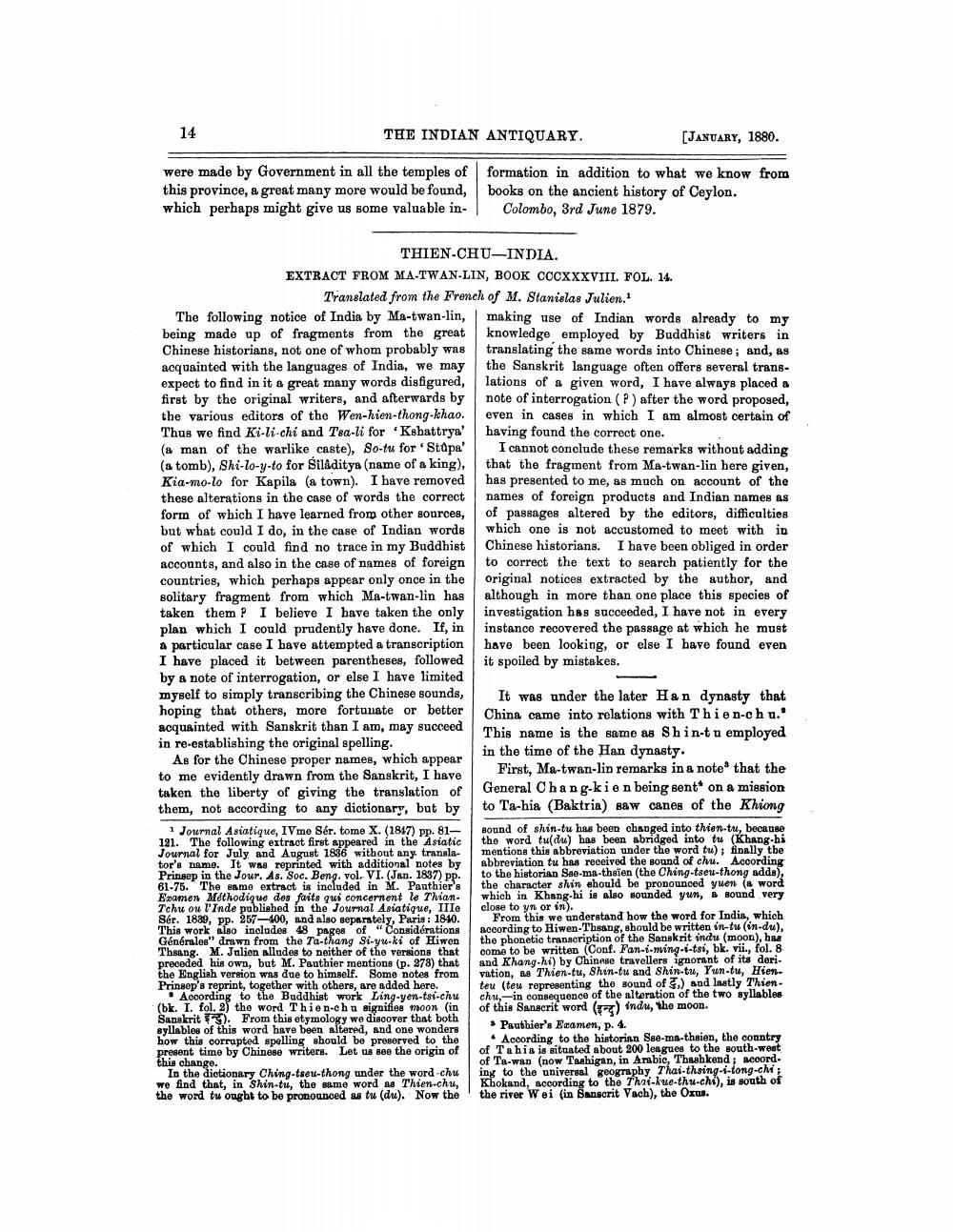________________
14
THE INDIAN ANTIQUARY.
(JANUARY, 1880.
were made by Government in all the temples of this province, a great many more would be found, which perhaps might give us some valuable in-
formation in addition to what we know from books on the ancient history of Ceylon.
Colombo, 3rd June 1879.
THIEN-CHU-INDIA. EXTRACT FROM MATWAN-LIN, BOOK CCCXXXVIII. FOL. 14.
Translated from the French of M. Stanislas Julien. The following notice of India by Ma-twan-lin, making use of Indian words already to my being made up of fragments from the great knowledge employed by Buddhist writers in Chinese historians, not one of whom probably was translating the same words into Chinese ; and, as acquainted with the languages of India, we may the Sanskrit language often offers several transexpect to find in it a great many words disfigured, lations of a given word, I have always placed a first by the original writers, and afterwards by note of interrogation (?) after the word proposed, the various editors of the Wen-hien-thong-khao. even in cases in which I am almost certain of Thus we find Ki-li-chi and Tea-li for Kshattrya' having found the correct one. (a man of the warlike caste), So-tu for 'Stupa' I cannot conclude these remarks without adding (a tomb), Shi-lo-y-to for Siladitya (name of a king), that the fragment from Ma-twan-lin here given, Kia-mo-lo for Kapila (a town). I have removed has presented to me, as much on account of the these alterations in the case of words the correct names of foreign products and Indian names as form of which I have learned from other sources, of passages altered by the editors, difficulties but what could I do, in the case of Indian words which one is not accustomed to meet with in of which I could find no trace in my Buddhist Chinese historians. I have been obliged in order accounts, and also in the case of names of foreign to correct the text to search patiently for the countries, which perhaps appear only once in the original notices extracted by the author, and Bolitary fragment from which Ma-twan-lin has although in more than one place this species of taken them PI believe I have taken the only investigation has succeeded, I have not in every plan which I could prudently have done. If, in instance recovered the passage at which he must a particular case I have attempted a transcription have been looking, or else I have found even I have placed it between parentheses, followed it spoiled by mistakes. by a note of interrogation, or else I have limited myself to simply transcribing the Chinese sounds, It was under the later Han dynasty that hoping that others, more fortunate or better
China came into relations with Thien-chu.' acquainted with Sanskrit than I am, may succeed
This name is the same as Shin-t u employed in re-establishing the original spelling.
in the time of the Han dynasty. As for the Chinese proper names, which appear to me evidently drawn from the Sanskrit, I have
First, Ma-twan-lin remarks in a note that the taken the liberty of giving the translation of General Chang-kie n being sent on a mission them, not according to any dictionary, but by to Ta-hia (Baktria) saw canes of the Khiong
1 Journal Asiatique, IVme Sér. tome X. (1847) pp. 81- sound of shin-tu has been changed into thien-tre, because 121. The following extract first appeared in the Asiatic the word tuldu) has been abridged into tu (Khang-bi Journal for July and August 1836 without any transla- mentions this abbreviation under the word tu); finally the tor's name. It was reprinted with additional notes by abbreviation tu has received the sound of chu. Acoording Prinsep in the Jour. As. Soc. Beng. vol. VI. (Jan. 1837) pp. to the historian See-ma-thsien (the Ching-tseu-thong adda), 61-75. The same extract is included in M. Pauthier's the character shin should be pronounced yuen a word Examen Methodique des faits qui concernent le Thian
which in Khang-hi is also sounded yun, sound very Tehre ou l'Inde published in the Journal Asiatique, IIIe close to yr or in). Sér. 1889, pp. 257-400, and also separately, Paris : 1840. From this we understand how the word for India, which This work also includes 48 pages of "Considérations according to Hiwen-Thsang, should be written in tu (in-du), Générales" drawn from the Ta-thang Si-yu-ki of Hiwen the phonetic transcription of the Sanskrit indu (moon), bus Thsang. M. Julien alludes to neither of the versions that come to be written (Conf. Fan-i-ming-s.tsi, bk. vii., fol. 8 preceded his own, but M. Pauthier mentions (p. 278) that and Khang.hi) by Chinese travellers ignorant of its deri. the English version was due to himself. Some notes from vation, as Thien-tu, Shin-tu and Shin-tu, Yunu, Hien. Prinsop's reprint, together with others, are added here. teu (teu representing the sound of ) and lastly Thien.
According to the Buddhist work Ling-yen-tsi-chure chu, in consequence of the alteration of the two syllables (bk. I. fol. 2) the word Thien-chu signifies moon (in of this Sanscrit word (0) Indu, the moon. Sanskrit 5). From this etymology we discover that both syllables of this word have been altered, and one wonders
* Pauthier's Examen, p. 4. how this corrupted spelling should be preserved to the • According to the historian See-ma-thsien, the country present time by Chinose writers. Let us see the origin of of Tahis is situated about 200 leagues to the south-west this change.
of Ta-wan (now Tashigan, in Arabic, Thaabkond; woord. In the dictionary Ching-tseu-thong under the word chu ing to the universal geography Thai-thsing 1-tong-chi; we find that, in Shin-tú, the same word as Thien.chu, Khokand, according to the Thai-kue-thu.ch). is south of the word tu ought to be pronounced as tu (du). Now the the river Wei (in Banserit Vach), the Oxu.




